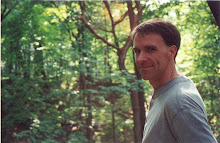[Virginia's Constitution on side of Richmond warehouse]
At a neighborhood coffee shop, I interviewed the young, wan waif behind the counter whose hair hung in fine blonde dreadlocks. Even on this summer day, she wore a heavy red shirt buttoned halfway down above her black skirt. She had a very slight nose, which might be why she kept pushing her glasses back up it.
"Well I'm not the person to ask," she responded, accompanying her speech with gangly arm movements. "I'm paranoid. I don't trust anybody, and I isolate myself. I think that the different groups of people are isolated from the other groups. Like the 'west enders' as opposed to the 'Jackson Ward.' I think Richmond really wants to have its boroughs, like New York City. But the boroughs here are only like five blocks. But as far as being isolated as individually from other people, I don't know. I think now in the U.S. [after 9/11], a lot of people have been brought together. I think it's short-lived. People don't vote, and they should.
"Personally," she continued, "I think we're really screwed up as a country compared to Europe. Or maybe we're not as screwed up, but people are trying to keep us that way. They try to fragment us, it seems. Who cares if you've got five piercings and green hair? It really doesn't matter anymore. It doesn't make an impact any more; some people are trying to tell you that you should be aghast at that or whatever. I don't know if it's the government or the older generation is trying to keep us in that isolated space when everyone's like, 'I don't care.'"
On the bench out front I spied a wiry, light-skinned African American guy, with close-cropped hair and tiny ears. As he answered in a high, nasal voice, he shrugged a lot, tenting his black T-shirt adorned with the logo of a band call the Rah Bras, with the letters playfully topped with Slavic accent marks. 
"I don't think so," he answered, looking askance, "It's just a small town. Hard to be isolated." After a pause, he asked himself, "What else can I say? It is definitely segregated. People hold on to their southern Civil War identity down here. There's more blacks than whites. And the city leadership and city council are all black. But when the Arthur Ashe monument went up in the early 1990s, there was still a lot of hullabaloo from the white people. They thought of Monument Row as a monument to the Confederacy.
"People in their neighborhoods hang together. It's such a small city that they should be able to all know each other, but they don't. Maybe we should be more together, but you could say that about any city. It's a difficult question. You have any other questions?"
"You have anything else to say?" I asked.
"It's a small town, that's all," he laughed, but then mumbled, "It's too small for me."
20090606
266 Richmond, VA: Shockoe Slip
Subscribe to:
Post Comments (Atom)




No comments:
Post a Comment